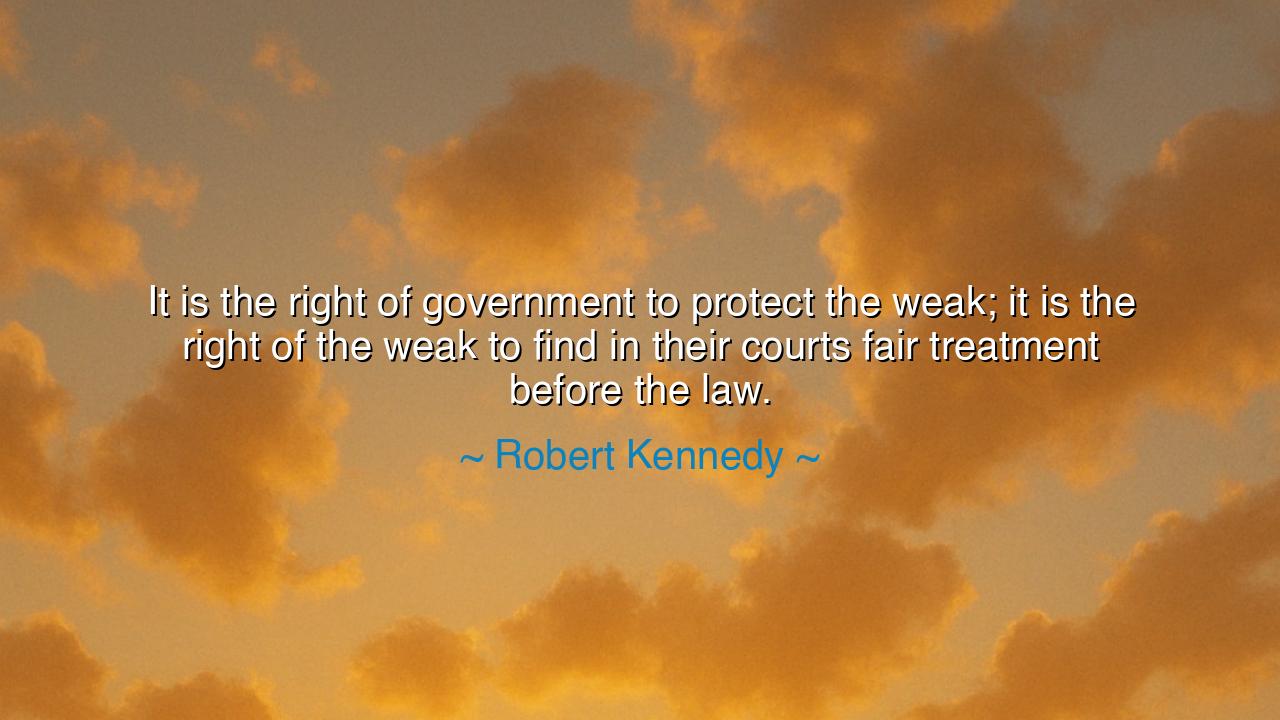
It is the right of government to protect the weak; it is the
It is the right of government to protect the weak; it is the right of the weak to find in their courts fair treatment before the law.






"It is the right of government to protect the weak; it is the right of the weak to find in their courts fair treatment before the law." – Robert F. Kennedy
In these words, Robert Kennedy, the brother of a fallen president and himself a warrior for justice, revealed the sacred bond between power and mercy. His statement speaks to the moral covenant that lies at the heart of civilization—that government exists not for the mighty, but for the vulnerable. The true test of any nation is not how it treats the privileged, but how it safeguards those who have no power, no wealth, no voice. Kennedy understood that the strength of justice is not measured by the punishment of the guilty alone, but by the protection of the innocent, the poor, and the oppressed.
The origin of this quote lies in Kennedy’s lifelong struggle for equality during one of America’s most turbulent eras—the 1960s. As Attorney General, he stood at the crossroads of law and morality during the Civil Rights Movement, when millions of Black Americans were denied the simplest rights of dignity and fairness. He saw how courts, once symbols of justice, had become instruments of delay and division. To him, restoring faith in law was not a matter of politics—it was a matter of the nation’s soul. His words were both a declaration and a plea: that government must not only enforce order, but embody compassion, and that courts must be sanctuaries where even the weakest could stand upright before the majesty of justice.
Kennedy’s message echoes through the ages, back to the oldest principles of law. In the ancient world, kings and rulers were judged not by the monuments they built, but by how they protected widows, orphans, and the poor. Even in the Code of Hammurabi, written nearly four thousand years ago, the duty of the ruler was described as "to prevent the strong from oppressing the weak." And in every age since, societies that forgot this sacred duty decayed from within. Kennedy’s words revive this timeless truth: power without justice is tyranny, and justice without compassion is empty.
A powerful example of this principle can be found in the life of Nelson Mandela. Imprisoned for twenty-seven years under the cruelty of apartheid, he could have emerged bitter and vengeful. Instead, when he rose to lead South Africa, he built a government that sought to protect the weak—even those who had once oppressed him. Through the Truth and Reconciliation Commission, he allowed both victims and perpetrators to find a voice, choosing fairness over revenge. His vision, like Kennedy’s, saw that justice must heal as well as judge. The weak must find refuge not only in mercy but in equality before the law.
Kennedy’s words also confront us with a warning. When the law ceases to protect the weak, when courts bend to wealth or influence, the very foundation of democracy begins to crack. For the law is not a weapon for the powerful, but a shield for the powerless. Without this balance, society descends into a hierarchy of fear and corruption. The poor lose faith, the rich lose restraint, and nations fall to ruin. The purpose of government, Kennedy reminds us, is not merely to command—it is to serve, to uplift, and to preserve the dignity of every soul under its care.
In the soul of every person, too, there lies a government—a conscience—that must protect its own weak. Our doubts, our wounds, our flaws deserve the same mercy that we demand from the world. To govern oneself with fairness is to build the character that sustains freedom. Just as the state must temper strength with compassion, so must the individual balance justice with empathy, lest they become harsh in the name of righteousness. Kennedy’s teaching thus extends beyond politics—it is a mirror for the moral life.
The lesson, then, is clear and eternal: the greatness of any nation—or any heart—lies in its defense of the weak. Justice and mercy must walk hand in hand, or both will perish. The courts must be places of truth, not of terror; governments must listen to the cries of the voiceless as carefully as they heed the commands of the powerful.
And so, the practical actions are these: defend those who cannot defend themselves; speak when silence serves only the oppressor; demand fairness in your laws, and fairness in your heart. For every act of compassion strengthens the foundation of civilization, and every injustice tolerated weakens it. Remember always that to protect the weak is not an act of charity—it is the very essence of justice, and it is upon this sacred truth that the destiny of nations depends.






AAdministratorAdministrator
Welcome, honored guests. Please leave a comment, we will respond soon